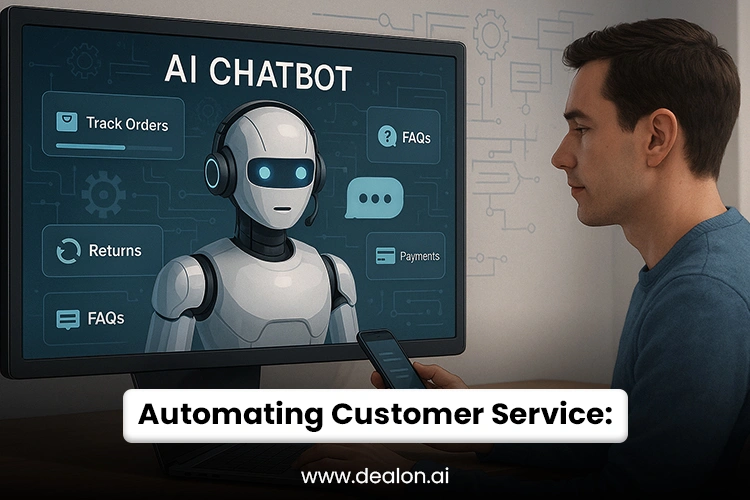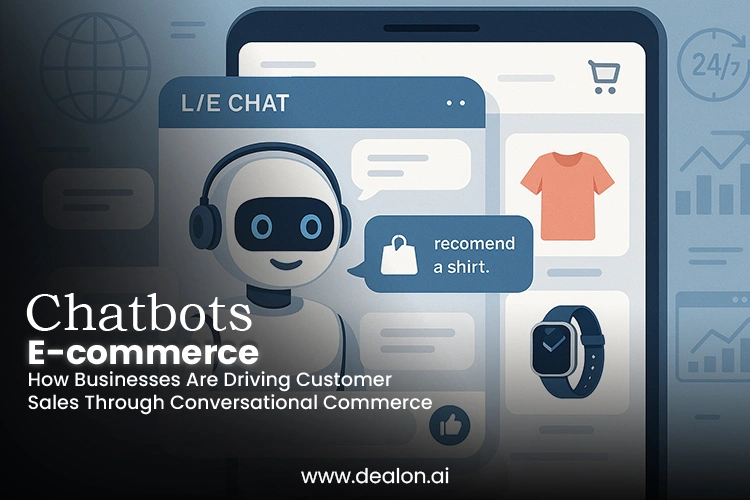Many companies in the industry are constantly working to find original ideas for better customer service, more effective selling processes, and memorable shopping moments. We are seeing chatbots added to conversational commerce, which is becoming a significant trend. Integrating AI and live communication, chatbots are helping companies interact with customers, build stronger bonds, and close more sales.
Earlier, Chatbots were mainly helpful for customer service, but now they can understand a buyer’s situation and guide with personalized support throughout the buyer’s journey. Predictive analytics driven by AI allows chatbots to examine user data as it comes in, foresee what consumers require, give personalized product suggestions, and help people make buying decisions while in a conversation. With this, shopping is made less complicated and better for customers as immediate help is offered on key subjects.
As people use chatbots in shopping more, e-commerce businesses need them to remain competitive online. These assistants make it easier to re-engage customers and help marketers send personalized messages to them, boosting their loyalty to the brand. Moreover, since companies can offer 24/7 customer service, people worldwide can get assistance at any time.
This article will explain the ways chatbots can change e-commerce, help businesses achieve better sales, and make them able to give personalized, efficient, and scalable help to customers. Come along as we look at conversational commerce and the changes it’s making in online shopping.
Also Read: Top 5 AI Tools for Creating Highly Engaging Social Media Content Campaigns
1. Enhancing Customer Experience Through Instant Communication

Because the internet has made everything move so fast, consumers assume they will immediately get answers when buying goods online. The old way of replying to emails or only helping customers during business hours isn’t enough now. People expect quick responses—for issues such as product supply, shipping dates, or order status. This is where having AI-based chatbots is very beneficial since people now expect quick responses.
Integrating AI-based chatbots on their websites and apps, e-commerce businesses are changing their customer engagement strategy. They are always on, which means that problems can be solved at any time, even if dawn or midnight has come. Because chatbots respond so fast to queries, they always keep customers engaged. Having real-time assistance allows consumers to decide quickly and make better choices.
In addition, the AI inside chatbots constantly updates and changes to match what users like making every chat more personal. By observing all the conversations, chatbots become more accurate at suggesting useful products as they go on. Because of this personalization, customers feel more involved with the brand and see positive results from their support requests. Since chatbots are there to help at any time, customer satisfaction increases, friction during buying lessens, and conversion rates increase.
2. Personalizing Shopping Experiences with Smart Recommendations

E-commerce businesses now use AI-driven chatbots to tailor their services for each user. These days, chatbots are not just there to answer simple questions—they use what they learn from talking with customers to make each interaction custom for the person they are assisting. By looking at a user’s purchases, past searches, and current behavior, chatbots recommend things that encourage sales.
AI chatbots use a lot of data to know what products consumers like, which styles appeal to them, and what their budgets allow. Should a customer keep looking at athletic wear, the chatbot might recommend related items such as running shoes, workout equipment, or supplements for athletes. Chatbots encourage upselling by suggesting more valuable items and cross-selling relevant products that go well with what a customer has already chosen. With personalized recommendations, the chatbot helps users have a unique and enjoyable shopping journey.
Besides suggesting products, AI chatbots can suggest offers for customers’ loyalty or purchase habits. As an illustration, a customer has become a regular buyer of one brand. The chatbot may present a special discount for the latest product from that brand, hoping to encourage the consumer to buy it. Because of this personalization, conversion rates go up, and the bond between consumers and the brand becomes stronger.
Chatbots that use AI to provide personalized shopping help keep customers happy, smooth the experience, and increase sales. Proposing helpful advice and special discounts allows businesses to motivate customers to buy again, create loyal relationships, and keep their customers coming back.
3. Automating Customer Service for Seamless Transactions

When businesses compete online, customer service is as vital as any other part of the business. But dealing with many customer inquiries often takes lots of effort and time which can cause problems with efficiency and response times. Automated chatbots are transforming customer service by doing tasks like order tracking, handling returns, answering FAQs and providing help with payments. Because chatbots carry out routine tasks, human agents can handle complex problems, boosting efficiency and decreasing costs.
Learning from talking with each customer is one of the most powerful features of AI chatbots. Eventually, these bots become smarter and respond to customers by noticing their actions. Because education does not stop, chatbots are updated and improved as time passes. Because of this, consumers can get their questions answered even faster and are better supported along their journey.
For example, rather than waiting for a customer service person to tell you how your order is progressing, you could use a chatbot to check your order status in real time and get advice on delays. Chatbots can handle the majority of the steps in the return process by asking for essential details and directing customers which helps avoid delays and needs less involvement from humans.
Thanks to automation, service is quicker, and the overall experience improves for customers simultaneously as budgets are saved. With better use of resources and less manual labor, chatbots allow companies to provide better customer service, boosting sales and customer happiness. As an organization grows, chatbots help maintain a familiar, quick, and enjoyable service for customers, which helps keep them with the business.
4. Increasing Conversion Rates with Abandoned Cart Recovery
A common problem in e-commerce is cart abandonment, when consumers add things to their cart but leave the website without buying anything. Many shoppers decide not to complete their purchases because the shipping comes across as too expensive, and the checkout gets too distracting for them. Using AI-powered chatbots to bring back abandoned carts has proven valuable and practical for businesses looking to improve conversion rates.
AI support allows companies to spot when customers don’t complete shopping, which helps them react quickly with personal advice on what to add to their orders. Chatbots can talk to the customer about the abandoned items and encourage them to return to finish placing the order. They target the forgotten items and offer people something special, such as a quick discount period, shipping without charge, or special deals, hoping it will convince them to buy. Such incentives make consumers hurry to take advantage of the deal before it finishes.
Chatbots can help people solve problems related to how they will pay or how the item will be delivered. A chatbot can guide users through money transfers, clear up the times for receiving their order, and offer similar unavailable products, all in the same chat conversation. Resolving these issues immediately with a chatbot smooth checkout helps customers finish their purchases.
Businesses can achieve higher conversion rates and not miss potential sales by using a chatbot for abandoned cart recovery. It saves effort and improves what the customer goes through by giving help promptly and sending the right offers. Because of this, e-commerce companies can see fewer abandoned shopping carts, higher sales, and greater customer satisfaction by using AI.
5. Streamlining Payment Processes with Chatbot Integration
Payment is sometimes the last step that must be completed for a customer’s purchase to succeed. The usual steps in checking out can be complicated and this might make customers give up and abandon their cart. This technology has changed how consumers pay since they can finish their payments via the chat interface.
When companies use chatbots that allow payments, customers can buy easily and avoid the typical troubles found during an online purchase. They do not need to visit other sites or complete long order forms; the chatbot helps them confirm their order and pay safely. Regardless of using a credit card, a mobile wallet, or a payment alternative, chatbots lead to simple and secure online shopping for the consumer.
By integrating, the website improves for its users and raises conversion rates. A quicker and easier way to pay increases how likely customers are to complete their transactions. A smoother shopping experience inside the chat and fewer problems make customers feel more comfortable with a business. A soft and enjoyable experience usually persuades consumers to return more often, boosting customer loyalty.
Chatbots powered by AI also help personalize how payment happens. They may suggest products or deals matching your previous purchase, increasing personalization. Chatbot integration with payment systems helps improve technology and boost brand satisfaction, sales, and customer loyalty.
6. Collecting Valuable Customer Insights for Data-Driven Marketing
Knowing how consumers behave online is key in e-commerce to design effective marketing plans. Even though chatbots are mainly used to enhance service, they have a wider purpose than just answering or helping people. By leaning on AI, chatbots gain insights from customers that help with marketing and support the success of a business in the long run.
All chats with a chatbot can give valuable details about what consumers like, what issues they have, and how they usually shop. As an illustration, chatbots note the items a customer is interested in, the answers they seek during ordering, and the features they are involved with. Analyzing these responses, businesses find out what their customers like, what products are favored, and where they may face issues, like worries about checkout or delivery options.
Being equipped with a lot of data, companies can change their marketing strategies on the spot. If chatbots highlight customer confusion about a product’s details, e-commerce companies might rewrite product descriptions or add more information in the FAQs. Also, if chatbots show many requests for one item, companies can focus on providing it and sometimes bundle it to increase each order’s total value.
Companies in online commerce can customize advertisements, group buyers by their online actions, and offer them more relevant ads, offers, or product suggestions. Using this data approach improves customer experience and increases conversion rates and sales, which is why chatbots are valuable for today’s marketing.
7. Building Brand Loyalty Through 24/7 Availability
Today, being fast-paced and highly connected means customers have raised their expectations. Consumers want help right away and being able to reach brands when scheduling is to them is now very important. Chatbots powered by AI are improving how companies deal with customers because businesses can fulfill their needs around the clock. Always available services make a big difference in helping brands establish loyal consumers.
Chatbots allow companies to give customer support and interact with customers 24/7, responding to their questions, helping them look at products, or assisting them in buying. A chatbot is available anytime for people shopping late or needing instant support, no matter their location. Because prompt responses make customers trust and rely on the company, which is valuable in building lasting relationships.
Besides, being regularly engaged with customers boosts the whole customer journey. When customers are confident they can get help anytime, they tend to buy more and return. They help customers resolve issues and can offer relevant product discounts, special deals, or loyalty bonuses, which bring people back to buy more and support their loyalty.
If a business provides 24/7 support, customers will feel valued, find it easy to reach for help, and rely on their service more. Having chatbots as part of the strategy helps a brand gain loyal customers, supporting its steady growth and success against competitors.
8. Reducing Operational Costs and Improving ROI
Firms strive for new and improved approaches to streamline their work and spend less. Thanks to AI, chatbots have become very important because they can now do many tasks that people would usually handle. Dealing with customer inquiries, processing purchases, and recovering abandoned orders are now managed by chatbots in e-commerce businesses. Allowing most operations to run without employees means less money is spent on daily operations.
E-commerce benefits from chatbots by automating tasks that need to be done regularly. Chatbots, for example, can monitor orders, take care of returns and guide customers in product recommendations. Because they do many things at once and much faster than people, chatbots replace a large customer support team, saving money on staffing and training costs. Because machines take over routine tasks, businesses can allocate resources to tasks requiring person-to-person handling.
In addition, using chatbots increases sales because they actively support customers throughout their shopping experience. Reaching out to consumers as soon as they visit, recovering unfinished transactions, and recommending personalized items are all factors that improve sales and profitability. Chatbots improve customer service, make buying easier, and boost the user experience.
Conclusion
Using AI-powered chatbots on e-commerce platforms changes how companies communicate with customers, simplifies daily tasks, and increases sales. Using chatbots helps companies improve customer satisfaction, make shopping fun, and increase their rate of sales. Using chatbots, companies can lower expenses and work more efficiently because tasks such as order monitoring and managing returns are automated.
Using chatbots allows businesses to offer smooth and immediate interactions, support loyalty to the brand and assure customers get help whenever needed. Consumers interact more with the company because of personalized recommendations, discounts, and quick service, resulting in higher sales and loyal repeat customers.
Looking further, chatbots collect information about customers which companies can use to make marketing decisions that improve their products and sales campaigns. Improvements in customer experience and higher future income are achieved by using chatbots, which lead to more conversions and save money on resources.

